How to Determine Concrete Slab Thickness
Knowing the thickness of a concrete slab can be important for several reasons. For new construction, you might need to know for QA analysis. If you’re working with an existing slab, you might need to know so you can anchor new equipment. One common reason is for proper moisture testing to ensure appropriate dryness for flooring finish installation.
In this article, we’ll look at several ways you can determine the thickness of a concrete slab:
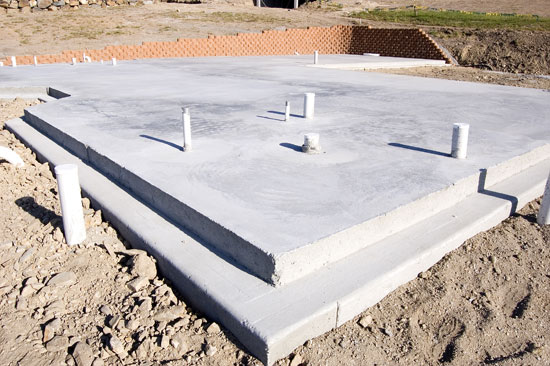
- Checking construction documents
- Measuring an exposed edge
- Drilling a hole for a wire probe
- Testing by a consultant
Common Methods of Determining Slab Thickness
If you’re looking at new construction, you should be able to check the construction documents to find the thickness of the slab. If the structure isn’t new, you might still be able to find the archived construction documents. Check with the owner, the general contractor or the architect.
If there’s some renovation or repair work being done, there might be some trenching in the slab for new plumbing or electrical. If there is, you can check the opening of the slab there.
If there’s no other way to determine the thickness, and drilling a small hole is acceptable, then you can measure the thickness with a piece of wire.
Here’s how to determine concrete slab thickness:
- Drill a small hole vertically through the slab.
- From a piece of wire that you think is long enough to go through the slab, bend a hook into the end that’s narrow enough to go into the hole.
- Insert the hooked end into the hole until you feel the bottom edge of the slab with the hook.
- Mark the top edge of the slab on the piece of wire.
- Pull out the wire and measure from the hook to the mark.
Testing by a Consultant
If it’s going to be difficult to determine the slab thickness yourself, you can hire a consultant to use non-destructive testing (NDT) technology. These technologies use sound or electromagnetic fields that do not damage the concrete. These technologies include:
- Impact-echo
- Ultrasonic pulse-echo
- Ground-penetrating radar
- Magnetic Imaging Tomography
Your consultant will determine which method is most suitable for your situation. The tests can be conducted quickly and easily with small, portable equipment.
Slab Thickness and Concrete Moisture Testing
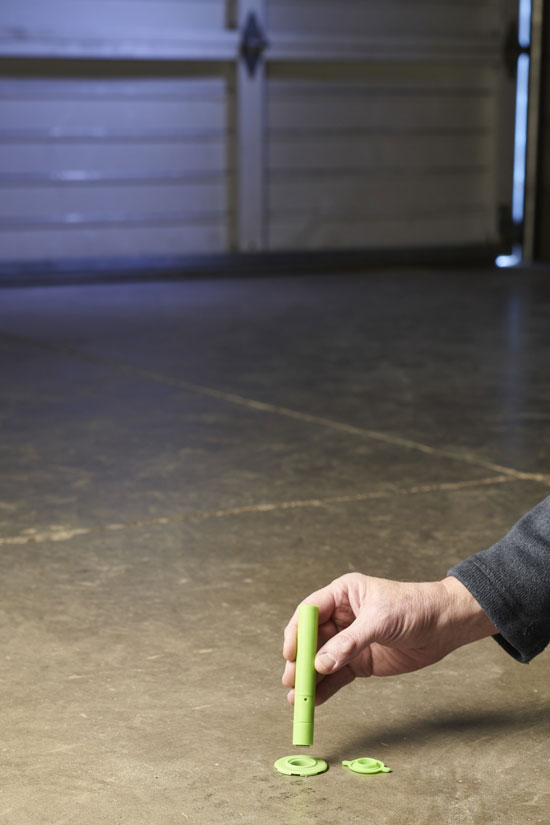 One of the most common reasons you might need to know the thickness of a concrete slab is for moisture testing. Any time you’re going to install a flooring system on a concrete slab, you need to test the slab for moisture. All concrete contains moisture, and if the moisture level is too high, it can cause serious damage to the floor.
One of the most common reasons you might need to know the thickness of a concrete slab is for moisture testing. Any time you’re going to install a flooring system on a concrete slab, you need to test the slab for moisture. All concrete contains moisture, and if the moisture level is too high, it can cause serious damage to the floor.
For the most accurate moisture test, the slab thickness must be known. Concrete moisture testing has been studied since the 1960s, and researchers have developed a scientifically proven test for measuring moisture levels in a slab.
The test requires sensors for measuring relative humidity to be inserted into the slab at very specific depths. For slabs drying from one side, the depth is 40% of the thickness. For slabs drying from two sides, the depth is 20% of the thickness. For that reason, knowing the thickness of the concrete slab is critical.
This test is called “the relative humidity test using in situ probes,” and it’s the basis for the ASTM F2170 standard. Wagner Meters provides an in situ concrete testing system that conforms precisely to ASTM F2170.
The Wagner Meters Rapid RH® L6 system uses single-use sensors for speed, economy, and ease of use. The L6 sensors come calibrated and documented from the factory. Once the sensors are installed in the slab and equilibrated for the required 24 hours, repeat readings can be taken without additional equilibration time. And unlike reusable probes, the L6 sensors never need calibration.
The Rapid RH Total Reader® reads, displays, and transmits temperature and relative humidity data via Bluetooth® to the DataMaster™ L6 app. The DataMaster L6 app stores, displays, and reports the data on your iOS or Android mobile device. From your mobile device, you can email PDF format reports to your client and all interested parties.
Backup copies of your readings are stored in the cloud and in the sensors that are permanently installed in the slab. This unbroken digital path from the sensor to the final report, plus automatic data backup ensures the highest data integrity, accuracy, and peace of mind.
Learn more about how to conduct moisture tests for concrete floors in our more in-depth article.
Conclusion:
Some reasons for needing to know the thickness of a concrete slab are:
- QA analysis
- Anchoring new equipment
- Moisture testing
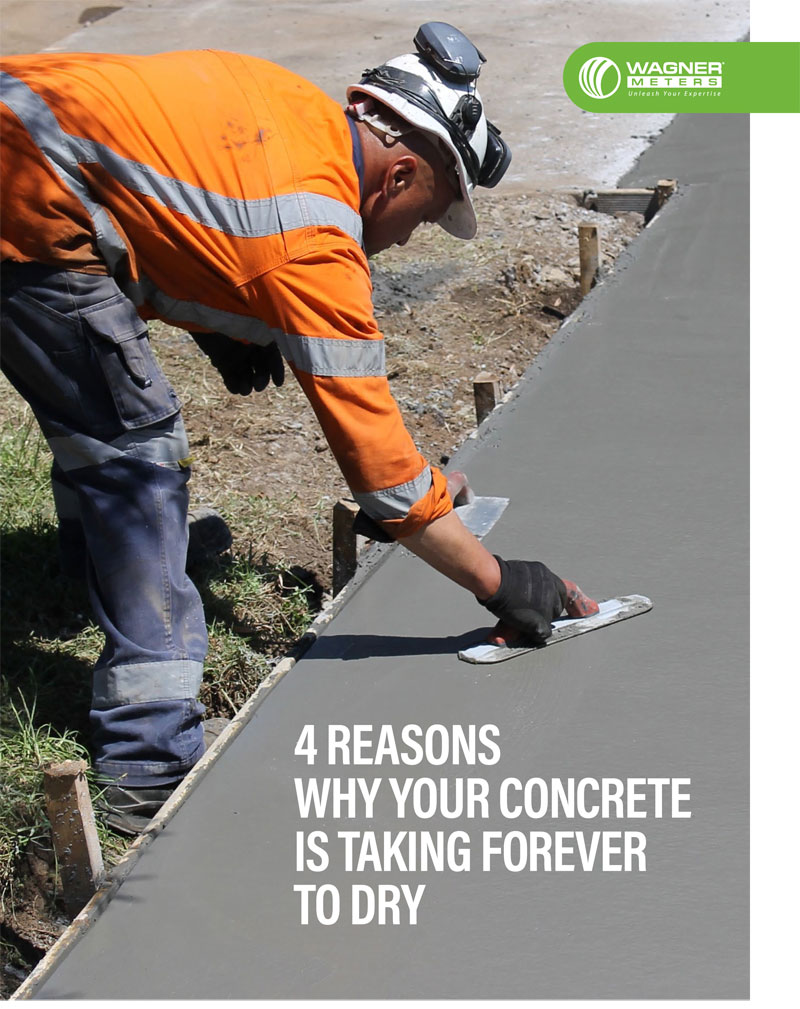
Free Download – 4 Reasons Why Your Concrete Is Taking Forever to Dry
Several methods to determine the thickness of a concrete slab are:
- Checking construction documents
- Measuring an exposed edge
- Drilling a hole for a wire probe
- Testing by a consultant
Are you looking for a concrete calculator to estimate how many cubic feet and cubic yards of concrete you will need to fill your space? Try out our concrete calculator.
Jason has 20+ years’ experience in sales and sales management in a spectrum of industries and has successfully launched a variety of products to the market, including the original Rapid RH® concrete moisture tests. He currently works with Wagner Meters as our Rapid RH® product sales manager.
Related Posts via Taxonomies
Last updated on February 25th, 2022

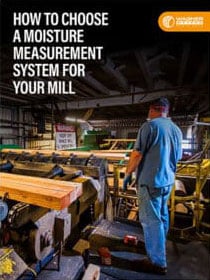
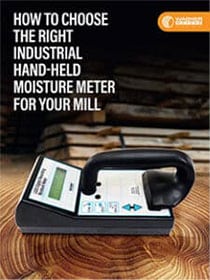

Thanks for giving a brief on concrete moisture meter! Informative Blog!
This page is full of information! Great work! helped me alot!
Hi, we are facing quite a difficulty to find the Roof concrete slab thickness and compressive strength. And we are unable to do the core test on the slab due to the embedded MEP services and we don’t have an archived construction document.
So kindly give me any advice for this case and we this basically to increase additional equipment load in the rooftop
Thanks
Thanks for the tip that concrete moisture tests are some of the most useful methods in determining the supposed thickness of a concrete slab. I’m planning to have a gazebo built in the middle of my garden in order to have a good place to hang out in for afternoon tea parties. I hope I can find a concrete specialist that can guarantee me that the foundation of the structure would be durable.